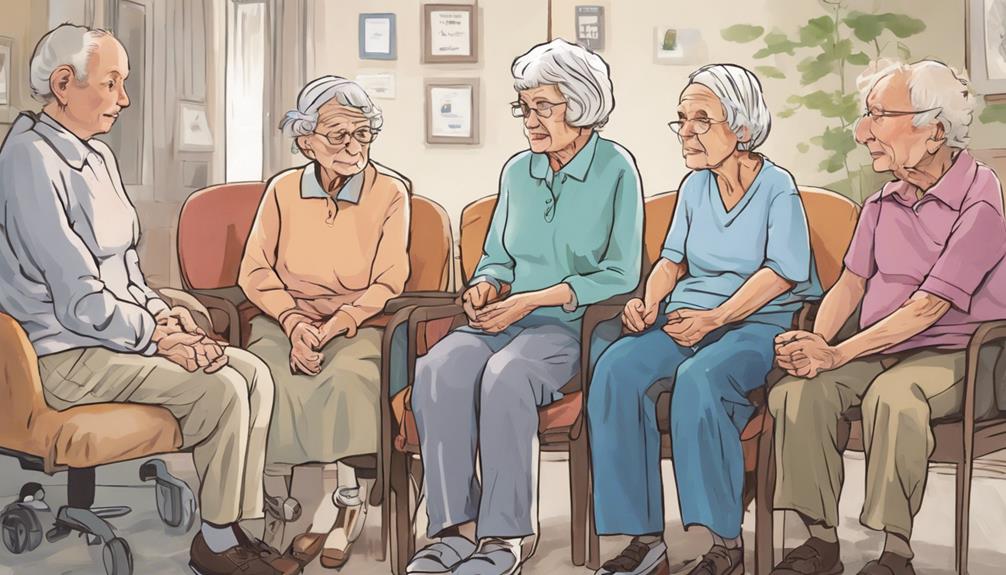Picture this scenario: one day, you are prepared to embrace the day with open arms, only to discover that the memories that shape your identity, the core of your being, are slipping away like sand through your fingers. This grim truth is what many individuals facing dementia must confront – a heartbreaking mental condition that strips away a person’s sense of self, autonomy, and connection to the world.
But amidst the darkness, there is light. Dementia care, shrouded in mystery for far too long, is slowly being revealed. A palliative approach, focused on enhancing the quality of life and providing holistic support, has the power to transform the lives of those affected by this relentless disease.
Through this journey of dementia care, we discover that it is not just about the individual with dementia; it is about all of us. It is about creating a compassionate and understanding society that embraces the unique needs of those living with dementia and their caregivers. It is about walking hand in hand, supporting one another every step of the way.
Key Takeaways:
- Dementia is a complex and progressive cognitive disorder.
- A palliative approach can transform the lives of those affected.
- Dementia care is a journey we must take together.
The Role of Caregivers in Dementia Care
Dementia care is a journey that starts at home, where family members become the primary caregivers. In this crucial role, caregivers provide unwavering support and navigate the challenges associated with dementia. Their presence and dedication form the bedrock of the support system for individuals living with dementia.
As caregivers, we have the honor of accompanying our loved ones on this transformative journey. Our role extends beyond physical assistance and encompasses emotional support, understanding, and compassion. We must exhibit qualities such as patience, empathy, and adaptability to navigate the ever-changing landscape of our loved one’s cognitive decline.
Caregiving for individuals with dementia requires a deep understanding of their unique needs and challenges. It involves helping with daily activities, managing medication regimens, ensuring safety, and providing companionship. Our commitment to their well-being can significantly impact their quality of life.
The Support System for Caregivers
Recognizing the demands of caregiving, it is essential for caregivers to have a strong support system in place. Building this network allows us to access resources, seek guidance, and share experiences with others who understand the journey we are on. Support groups, both in-person and online, provide opportunities for connection and emotional support alongside practical advice.
The journey of caregiving can be challenging, and it is important for us to take care of our own well-being. This involves addressing our physical and emotional needs, seeking respite when necessary, and not hesitating to ask for help. By prioritizing self-care, we ensure that we are better equipped to provide the care our loved ones deserve.
“Being a caregiver can be demanding, but the rewarding moments of connection make it all worthwhile.” – [Quote from an expert caregiver]
While caregiving can be fulfilling, it is also normal to experience a range of emotions, including stress, frustration, and sadness. Taking breaks, practicing stress management techniques, and seeking professional support, like counseling or therapy, can help us navigate these complex emotions.
The Empowered Caregiver
As caregivers, we play an integral role in advocating for our loved ones and ensuring they receive the best possible care. Being informed about available resources, care options, and advancements in dementia care allows us to make informed decisions and actively participate in the care planning process.
It is also crucial for us to foster open lines of communication with healthcare professionals and share our insights about our loved one’s condition. Our firsthand knowledge can contribute valuable insights that aid in tailoring care strategies and improving our loved one’s quality of life.
| Key Responsibilities of Caregivers in Dementia Care | Impact on the Individual with Dementia | Benefits for the Caregiver |
|---|---|---|
| Assistance with daily activities | Enhanced sense of security and well-being | Opportunity for personal growth and fulfillment in helping others |
| Providing emotional support | Reduced feelings of isolation and anxiety | Stronger emotional bond with the care recipient |
| Ensuring safety and well-being | Prevention of accidents and potential harm | Increased sense of purpose and fulfillment |
Caregivers are the unsung heroes in the realm of dementia care. Their tireless efforts and unwavering dedication make a profound difference in the lives of those affected by dementia. It is our collective responsibility to recognize, support, and empower caregivers as they navigate this challenging yet impactful role in dementia care.
The Impact of Dementia on Families
Dementia doesn’t just affect the individuals diagnosed, but it also has a profound impact on their families. The emotional toll can be significant as families navigate the challenges and changes brought about by dementia.
Spouses, children, and extended family members often experience a range of emotions, including sadness, frustration, and even guilt. Watching their loved one’s cognitive abilities decline can be heartbreaking, and the shifting roles and relationships within the family dynamic can be difficult to navigate.
“Dementia has this way of turning your world upside down. It feels like we’re losing pieces of our loved one every day,” shares Susan, whose husband has been living with Alzheimer’s disease for several years.
“It’s like a roller-coaster of emotions. Some days, I feel overwhelmed and lost. Other days, I find strength and resilience to keep going. One thing is for certain, though – we are in this together, and we refuse to let dementia define us.”
Families have to adapt to the changing needs and abilities of their loved ones. They often find themselves tackling new responsibilities, such as managing medications, handling finances, and providing round-the-clock care. The physical and emotional demands can be overwhelming.
Despite these challenges, it’s crucial for families to find ways to cope and support one another. Open and honest communication is key to ensuring that everyone’s needs are met. Sharing concerns, fears, and victories can help alleviate the emotional burden and foster a sense of understanding within the family unit.
“We’ve learned to cherish the small moments of clarity and connection,” says Michael, whose mother has been living with dementia for several years. “We might not have the same conversations we used to, but just being present with her and holding her hand brings us a sense of peace and connection.”
Building a support network is also crucial for families affected by dementia. Connecting with local support groups, seeking guidance from healthcare professionals, and accessing community resources can provide much-needed support and alleviate the sense of isolation that families often experience.
Together, families can navigate the challenges of dementia, finding strength in unity and love. By prioritizing self-care, maintaining open lines of communication, and seeking support, families can better withstand the emotional toll and maintain the meaningful connections that are so important during this journey.

Finding Emotional Support: Resources for Families
Having access to appropriate resources and support is crucial for families affected by dementia. Here are some organizations that offer emotional support and valuable information:
| Organization | Contact Information |
|---|---|
| Alzheimer’s Association | Website: www.alz.org Helpline: 1-800-272-3900 |
| Dementia Alliance International | Website: www.dementiaallianceinternational.org Email: info@dementiaallianceinternational.org |
| Caregiver Action Network | Website: www.caregiveraction.org Helpline: 1-855-227-3640 |
The Importance of Early Detection in Dementia Care
Early detection plays a crucial role in effective dementia care, providing opportunities for better planning, access to resources, and informed decision-making. By identifying dementia in its early stages, individuals and their caregivers can proactively manage the condition and improve the overall quality of life. Regular medical check-ups, cognitive assessments, and open communication with healthcare professionals are key components of early detection strategies.
“Detecting dementia early allows for timely intervention and support,” explains Dr. Sarah Johnson, a renowned neurologist specializing in dementia care.
“Through early detection, we can implement appropriate care strategies tailored to the specific needs of individuals with dementia, ensuring they receive the best possible support.”
Medical check-ups, including cognitive screenings, provide valuable insights into cognitive function and help identify potential signs of dementia. These assessments involve a series of tests to evaluate memory, thinking skills, and overall mental functioning. By actively participating in these assessments, individuals and their families can actively contribute to the early detection process and gain a clearer understanding of the condition.
| Benefits of Early Detection in Dementia Care |
|---|
| 1. Enhanced planning and decision-making |
| 2. Access to appropriate resources and support services |
| 3. Reduced caregiver burden |
| 4. Improved management of symptoms |
| 5. Increased opportunities for intervention and treatment |
The benefits of early detection extend beyond the individual with dementia, positively impacting the entire support system. Recognizing the early signs and symptoms allows families to engage in proactive care planning, establish appropriate support systems, and navigate the challenges that lie ahead.

Creating a Supportive Environment for Dementia Care
Designing a supportive environment is crucial in providing effective dementia care. Small adjustments can make a significant impact on the daily lives of individuals with dementia, promoting their well-being and enhancing their quality of life.
In order to create a supportive environment, several factors need to be considered:
- Minimize Clutter: A clutter-free environment reduces sensory overload and confusion for individuals with dementia. Clear pathways and organized spaces help them navigate their surroundings with greater ease and confidence.
- Ensure Adequate Lighting: Good lighting minimizes shadows and improves visibility, making it easier for individuals with dementia to identify objects, read, and move around safely. Natural light and well-placed artificial lighting can significantly enhance their daily experience.
- Foster Familiarity: Surrounding individuals with familiar objects, photographs, and mementos can evoke positive memories and provide a sense of comfort and security. Familiarity helps to maintain a connection with their personal history and identity.
- Establish Routine: Creating a structured daily routine helps individuals with dementia feel more in control and reduces anxiety. Having consistent meal times, regular activities, and familiar rituals can provide a sense of stability and comfort.
- Promote Calmness: A calm and quiet atmosphere can soothe individuals with dementia, reducing agitation and stress. Soft background music, aromatherapy, and comfortable seating areas can contribute to a peaceful environment.
By implementing these strategies, we can create a supportive environment that enhances the daily lives of individuals with dementia. It is essential to remember that every individual is unique, and adapting the environment to their specific needs and preferences is key to providing person-centered care.

Conclusion
Palliative approaches in dementia care have the power to transform the lives of individuals with dementia and their caregivers. By adopting a person-centered and holistic approach, we can enhance the quality of care and support provided, paving the way for a more compassionate and understanding society.
Dementia care goes beyond addressing the physical symptoms; it requires acknowledging and addressing emotional and social needs as well. By creating a supportive and nurturing environment, we can preserve the dignity and well-being of those affected by dementia.
Together, let us embark on this transformative journey in dementia care. By implementing palliative approaches, we can navigate the challenges, offer comfort, and provide a lifeline of support to all those involved. It is through our collective efforts that we can make a positive difference in the lives of individuals with dementia and their loved ones.
FAQ
What are the different types of dementia?
Dementia encompasses various types, including Alzheimer’s disease, vascular dementia, Lewy body dementia, and frontotemporal dementia.
What is the role of caregivers in dementia care?
Caregivers play a vital role in providing support and managing the challenges associated with dementia, exhibiting patience, empathy, and adaptability.
How does dementia impact families?
Dementia has a ripple effect on families, causing emotional distress and shifting roles and relationships, requiring coping mechanisms, communication, and maintaining meaningful connections.
Why is early detection important in dementia care?
Early detection allows for better planning, access to resources, and informed decision-making, making regular check-ups, cognitive assessments, and communication with healthcare professionals crucial.
How can a supportive environment benefit dementia care?
Designing a supportive environment, through small adjustments like minimizing clutter and ensuring adequate lighting, contributes to a sense of security and well-being in the daily lives of individuals with dementia.
How can palliative approaches transform dementia care?
Palliative approaches, by adopting a person-centered and holistic approach to address the emotional, physical, and social needs of individuals with dementia, can enhance the quality of care and support provided.










